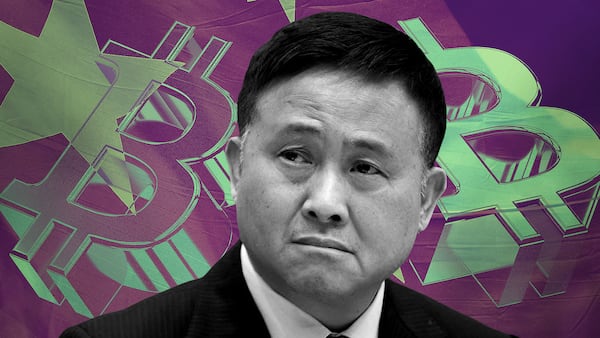- Australia’s government is cracking down on crypto after 2022′s scandals.
- At the same time, some banks have pulled their services from crypto firms.
- Blockchain Australia’s new CEO warns these “catastrophic” actions risk killing the nation’s industry.
Simon Callaghan is on the warpath.
The new CEO of Blockchain Australia took the helm at the lobby group in June at a crucial moment for the country’s crypto companies.
“We are battling for what the future of this industry will look like,” he told DL News.
Crypto companies thrived in Australia before Covid-19, but recent scandals have motivated lawmakers to introduce stricter laws and some banks to pull their services, often citing fears of new rug-pulls and crashes.
NOW READ: Powerful central bank group says crypto ‘amplifies’ risks and contributes nothing to society
The shift “could be catastrophic” for the industry, the people who work in it, and could see the country miss out on a billion dollar opportunity, Callaghan said.
In response, Blockchain Australia is engaging with regulators, lawmakers, and lenders to convince them that the industry isn’t as bad as headlines make out.
Australia’s crypto industry has grown
“Australia has a strong history of innovation,” Callaghan said, pointing at how Google Maps began as a Sidney-based startup called Where 2 Technologies.
For Callaghan, the nation’s early adoption of crypto is another example of that entrepreneurial spirit.
Cryptocurrencies achieved full legal status in Australia in 2017, resulting in 300,000 Australian customers trading about AUD$4 billion worth of digital dosh that year, research by Accenture and the Australian Digital Commerce Association shows.
Since 2018, crypto firms have had to register with the Australian Transaction Reports and Analysis Centre, provided they comply with anti-money laundering and counter-terrorism laws.
In February 2020, 312 digital currency exchanges had registered. That number has swelled to more than 400 today, AUSTRAC told DL News.
In 2021, the industry contributed $2.1 billion to the Australian economy and employed 11,600 people, according to an EY report, which estimated those figures may rise to $68.4 billion and 200,000 people by 2030.
While US regulators have yet to approve spot Bitcoin exchange-traded funds like the ones recently applied for by BlackRock and Fidelity, Oz saw its first Bitcoin ETF in May 2022.
NOW READ: It’s not just Bitcoin. These finance giants are ‘chomping at the bit’ to deploy DeFi
The launch of the ETFs — one by ETF Securities and 21Shares, and another from Cosmos Asset Management — were the fruition of a five-year campaign.
The debuts proved anticlimactic. The same day they listed, Terraform Labs’ reserve asset Luna crashed by 99.7%, unleashing a chain-reaction resulting in jailed crypto kings and more bankruptcies.
The Anthony Albanese Labor-led government commenced days later, as the industry burned and investors lost millions of dollars.
‘[If] it looks like a duck, walks like a duck and sounds like a duck then it should be treated like one’
— Stephen Jones
Between 2021 and 2022, the annual loss of crypto to scams jumped by 162.4% to AUD$221.3 million (US$149.1 million), the Australian Competition and Consumer Commission reported in April.
The government soon took action.
NOW READ: The ‘CryptoQueen’ is said to be dead but $4bn OneCoin fraud case springs back to life
By the start of 2023, Financial Services Minister Stephen Jones told the industry to brace for stricter rules, which may see digital assets acting like financial products and regulated as such to protect customers.
“[If] it looks like a duck, walks like a duck and sounds like a duck then it should be treated like one,” Jones told Sidney Morning Herald.
‘We would lose jobs’
The Australian Securities and Investments Commission and the Commonwealth Bank supported the position, but industry reps rejected it.
Blockchain Australia, which counts the likes of Binance and Ripple among its members, also objected.
‘Businesses would move overseas. They would move to Singapore. They would move to Hong Kong. They would move to Dubai and Abu Dhabi’
— Simon Callaghan
The prospect of blanket regulation failing to capture the “nuances” of crypto’s differences from traditional finance could “kill the industry, kill innovation,” Callaghan said.
“We would lose jobs,” he added. “Businesses would move overseas. They would move to Singapore. They would move to Hong Kong. They would move to Dubai and Abu Dhabi.”
Callaghan advised the government to adopt an “holistic approach” that “doesn’t crush innovation and, obviously, protects consumers.”
When asked if that doesn’t just translate to light-touch regulation with little bite, Callaghan said that wasn’t how he would phrase it.
“You can’t have a blanket approach [that takes] existing regulations and simply apply those to crypto because they are a vastly different matter,” he said.
Rather than adopting the approach of the US, where the Securities and Exchange Commission has fired off barrage of enforcement actions, Callaghan said the government should look to places like the European Union, the United Kingdom and Singapore for inspiration and “build a best-fit-for-purpose model.”
Banks pull services
While agreeing that crypto companies’ customers deserve proper protection from scammers, Callaghan openly opposed several Australian lenders — including Commonwealth Bank of Australia, Wespac, Cuscal, and National Australia Bank — that have cut off crypto firms from some services in recent months, citing scam risks as a main reason behind the decisions.
NOW READ: Big game hunting is back: Ransomware gangs set for $900m haul this year
The cut-offs may make it harder for Australian firms who “do the right thing” to attract investment, which could end up hurting the growth of the nation’s economy, the Blockchain Australia CEO said.
Instead of a blanket ban on crypto, the banks should “make an assessment case by case” and ignore pressure from the government, Callaghan said.
To do otherwise, would equate to being on the wrong side of crypto history, he said.
Callaghan added: “It’s not going away.”
Do you have a tip about the Australian crypto industry or another story? Reach out to me at eric@dlnews.com.



